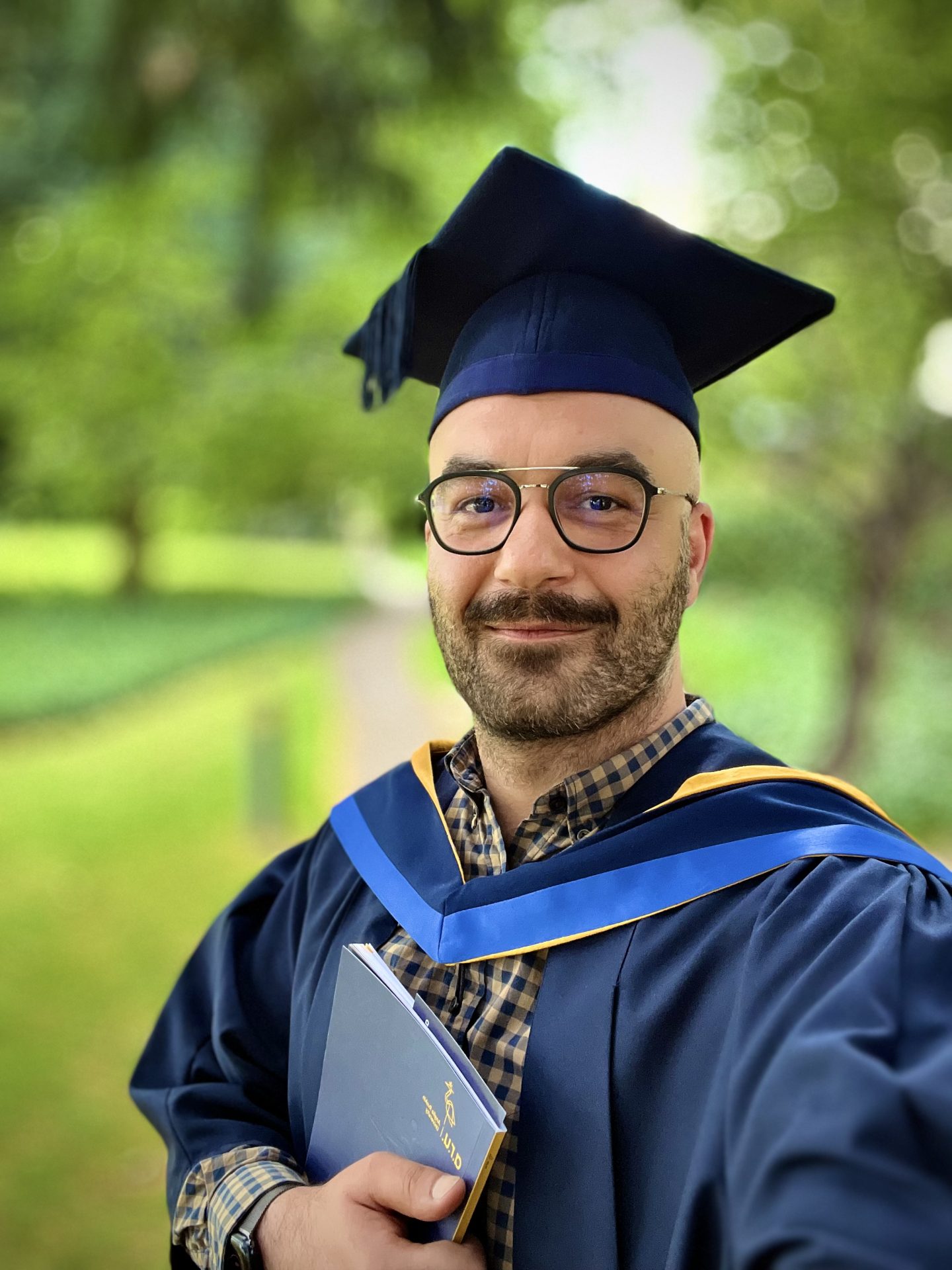About your MA TESOL and applied linguistics
Our masters in TESOL and applied linguistics is perfect for those involved in any aspect of foreign language teaching who seek to further their theoretical understanding of language learning. You’ll learn the latest linguistics theories that you can apply to your classroom practice and gain critical and analytical skills that will boost your career prospects. When you study a linguistics degree via distance learning, you’ll have the opportunity to advance your career around your other commitments.
Course highlights
- Pursue your specific teaching interests with our range of optional modules
- Take an active role in our research seminars and conferences
- Receive support every step of the way from our dedicated distance learning team
How you'll study
Study online with an option to study on campusStart dates
Start in January or September
Application deadline
Our next deadline is30th April 2024
Fees: £8,200
Course overview
An MA TESOL and applied linguistics will enhance your own classroom practice and career development by giving you the chance to explore the latest theories in topics such as second language acquisition and social discourse. You’ll improve your theoretical understanding of language learning, which will help you to develop your professional teaching skills.
Our online linguistics qualification will teach you to conduct your own research, and help you gain transferable skills for your future career such as compiling and analysing qualitative and quantitative data and developing your critical-evaluative skills. You will then put these skills to use on your own research project at the end of the course.
When you play an active role in our research seminars and conferences, you’ll have the chance to engage with other students and scholars of linguistics studies. We’ll also help you make valuable contacts for your future through our links to language companies such as EF, Bell, and Studio, a group for heads of language schools.
Our MA TESOL onlineMA generally takes just over two years to complete. You will be given two years teaching time, however you will also have additional time to submit your Major Project – either one or two trimesters.
Modules
Core modules
Classroom Theory and Practice
This module is intended for students who are seeking to develop their knowledge and understanding of learning and teaching English to Speakers of Other Languages (TESOL). You will examine current research on modern classroom operations, exploring key concepts and issues through relevant professional and academic literature. A more practical element will be realised through filmed observation of teachers in practice. You will also be encouraged to reflect on your teaching and learning experience; analysing and discussing your beliefs and attitudes towards learning and teaching.Second Language Acquisition
This module will focus on the major themes that have emerged from literature on second language learning over the last three decades. You’ll examine some of the research on the second-language acquisition process, look critically at reports of second-language research, and examine some of the theories which endeavour to interpret research evidence. You will be encouraged to use your own language learning and experience of teaching linguistics to assess the relative merits of such materials.Major Project
This module will support you in the preparation and submission of a master’s dissertation, allowing you to undertake in-depth research into a topic that reflects your academic interest. You will be able to demonstrate the ability to raise significant questions in relation to your specialist research area. It allows you to develop a detailed knowledge of your research area, a critical understanding of appropriate methodologies and theories, the ability to draw well-argued conclusions from information which may be complex or contradictory and the capacity to expand or redefine existing knowledge and/or to develop new approaches to the study of a particular area within the field.Optional Modules (subject to availability)
Postgraduate Research Methods
In this module you will gain the research skills and techniques needed both to critically evaluate the literature you will be using in your course and to put into practice in your own dissertation. We will explore the methodologies and methods applied in contemporary social science research to enable you to select an appropriate range for your own needs. You will have the opportunity to experiment with a variety of methods so that you will fully understood them and be able to adapt them creatively for your own projects. The module will place research methods in a wider framework of social research strategies at a postgraduate level. We'll examine the research design options available to you at Masters level and explore thoroughly the issues involved in planning a research project and formulating research questions.Communication and Conflict
This module is designed to explore historical and thematic approaches to reporting on conflict and also how communication functions in a crisis. The module will examine the reciprocal relationships between the military, governments and the media, including how the media can be used to legitimise conflict, and the changing role of social media in building consensus and protest, including the use of Twitter and Facebook to organise demonstrations and undermine the power of state-dominated discourses. More traditional forms of communication will also be examined, including censorship and propaganda, and whether the state is ever able to retain control of the narrative, as well as the role of the war reporter, and the way in which governments can utilise the independent media and how independent it really is. Other areas of exploration include consent, public interest, ethics and the representation of suffering, looking at whether the dominance of media in the debate in the West means that public interest in conflict is limited by the limitations of the media, and what this means for winning hearts and minds during insurgencies, military interventions and peacekeeping operations. Finally, the module will look at the way war and conflict is portrayed in fictional accounts and the underlying assumptions of such portrayals, and will examine conflicting discourses about war in post-conflict environments and the way the media can contribute to or hamper the process of post-conflict reconstruction Themes throughout the module will include the question of who owns, defines and propagates the truth, and the implications of this in the context of conflict and war.Teacher Development and Management
In this module you will develop an understanding of the issues and practices concerned with developing and training teachers of English to speakers of other languages. You will examine current and recent research and explore the key concepts and practices in areas such as observing teachers and giving feedback, designing training programmes, leadership in academic management and professionalism within teaching. You will watch live or recorded lessons and develop ideas about what feedback you would give on the lessons to develop the teacher’s skills. You will reflect on your own experience of working within teaching organisations.Language, Communication, Identity
In this module, you will explore the interrelationships between language, culture and society, and identity. Starting by looking at the connection between language and the individual, we examine key concepts of identity and linguistic variation. The notion of ‘self’ and its relationship to language is being investigated in the context of different social and cultural dimensions, including gender, race and ethnicity. The second part of the module moves towards a discussion of language policy from several angles. Using a case-study approach, we explore policy-making, including national language policies and aspects of educational policy in which language play a key role. You are encouraged to critically reflect on how your own lived experience relates to the issues under consideration in the module.Materials and Course Design
You will explore the factors involved in the design of language courses and teaching materials, reflecting on one possible process of course design. You will start with an analysis of the context in which the course will take place, the needs of the learners, and current theories of language and language learning. You will move on to consider how course content can be selected and ordered in a principled way, how assessment relates to course design, and how and when courses should be evaluated. Finally, you will consider the evaluation, adaptation and creation of course materials. The face-to-face seminars will be a combination of teacher input, student input and discussion, both in groups and whole class. Students taking part in distance delivery will work in a small group with support from the tutor by means of the Virtual Learning Environment, with progress monitored through formative tasks. The assessment will be in the form of a portfolio and will give you the opportunity to consider what particular syllabus might be relevant to your own current or future teaching context. The elements of the portfolio will relate to particular units of the module, and the portfolio can therefore be progressively built up as the course proceeds.Assessment
You’ll show your understanding of theoretical issues and their practical application through a combination of portfolios, classroom observation tasks and critical essays. After completing your final module, you’ll also research and prepare a 15,000-word major project.
Meet your tutors
Dr Sebastian Rasinger
Sebastian is a Senior Lecturer in Applied Linguistics and the Course Leader for the MA Applied Linguistics and TESOL. His primary research interests fall into two main areas. The first of these is second language acquisition and urban multilingualism, with a particular focus on language use and its impact on linguistic development and the emergence of ethnic and cultural identity. The second of his research interests involves the representation of minority groups in public discourse, using both corpus analysis and methods derived from Critical Discourse Analysis. A chapter on this topic has also been published in an edited volume on 'Research Methods in Linguistics' (2010. ed. L. Litosseliti. Continuum).
Sebastian is a Fellow of the HEA and a member of the editorial boards of The Asian EFL Journal and The European Journal of Applied Linguistics and TEFL.
How you'll study
Our Applied Linguistics and TESOL MA can be studied 100% online or you can study at our Cambridge campus. If you would prefer to study on campus all teaching takes place in the evening allowing for flexibility around your other commitments.
You’ll study online through Canvas, our world-class Learning Management System (LMS), which can be accessed from your phone, PC or tablet, both at home or on the move. Canvas provides instant access to study materials, forums, and support from tutors and classmates, as well as enabling easy submission of your assignments.
On successful completion of your studies, you’ll be invited to attend a graduation ceremony on campus. If attending the ceremony in person is not possible then we’ll arrange to have your certificate sent to you.
Supported distance learning
We understand that distance learning is different to traditional campus study and if you’re new to online study you may have concerns or apprehensions about studying your MA Applied Linguistics and TESOL online, and that’s natural.
To help put your mind at ease we have a dedicated Distance Learning Support Team to help and support you throughout your time at ARU, starting with your first online induction and staying with you right through to graduation. In addition, you’ll also be supported by specialist TESOL course tutors who are experienced in language teaching methodology. Our expert team are skilled in supporting distance learning students and will provide you with the support you need throughout your studies.
Once you start your MA TESOL and applied linguistics, we encourage the creation of online communities and many of our learners find these connections with others invaluable, helping them to stay motivated, share concerns or make new friendships.
Contact us to talk through any questions or concerns or visit our support page for more information about the support services available.
Be part of the University of the Year
We're proud to be the Times Higher Education (THE) University of the Year 2023.
The prestigious THE awards honour ’exceptional performance during the 2021-22 academic year, and reflect ARU’s success in delivering high-impact projects during this period, despite the challenges of the Covid-19 pandemic.
The award recognises the difference we make in the region and our communities – while also acknowledging the broader impact of our world-leading research, and the contributions our students and graduates make to society.

Careers
What could a masters in TESOL and applied linguistics do for my career?
This course aims to enhance students’ value to employers in a variety of professional arenas, but particularly in areas related to learning and teaching of languages and applied linguistics.
We'll help you do this by providing you with the tools to further your knowledge and expertise in the field of language learning and, therefore, strengthen your teaching practice in the classroom. You'll develop critical awareness of developments on foreign language teaching and explore the fundamental issues around language, language learning and language teaching.
What job roles can I consider with an MA Applied Linguistics and TESOL?
Potential job roles that relate to teaching and applied linguistics may include:
- EFL/TESOL Teacher in a variety of settings
- Curriculum Leader
- Teacher Trainer
- Educational Consultant
- Language testing
- Curriculum development
- Department Head or Director of Studies
- Private Tutor
If you are looking for more information about these job profiles and potential salary earnings see Prospects.ac.uk. It’s important to note that salaries can vary widely depending on the job role, employer, industry sector and location.
What skills will I get from a TESOL course to help my career?
Choosing to study an Applied Linguistics and TESOL MA will give you many transferable skills. Here are just some of them:
- You will develop critical awareness, critical analysis, and original thinking skills
- You’ll enhance your analytical and research skills to master’s level
- Gain a better understanding of ethical and cultural issues
- Work with increasing independence.
What can I study after an Applied Linguistics and TESOL MA?
Depending on your long-term goals and interests you may decide to explore a doctorate qualification. Having a master’s degree under your belt is a key entry requirement in opening doors to study at this level.
Careers Advice Service
Once you become an ARU student you will be able to access our Employability service to help you at whatever stage of your career, whether that’s landing your dream job or the next progression step.
We offer:
- careers advice, including one-to-one online and telephone appointments with our experienced advisers
- help with your CV, job searches, applications, and interview preparation
- an online portal packed with useful careers resources
- our Employability Programme, which helps you hone the skills employers say they want in graduates.
Entry requirements
- A good honours degree (or equivalent), normally in a related subject. Applicants with professional experience are also encouraged to apply.
- If you have completed a level 7 teaching qualification, such as a PGCE, Cambridge DELTA or DipTEFL within the last five years, we may be able to accredit this towards your course.
- If English is not your first language, you will be expected to demonstrate a certificated level of proficiency of at least IELTS 6.5 or equivalent.
- As a distance learner, you'll also need a suitable computer with internet connection, together with sufficient IT competence to make effective use of our online Learning Management System (LMS) with high-speed internet and email.
Accredited Prior Learning
Students who have successfully completed the Bell English DELTA programme, or equivalent from other providers, will be awarded a 60 credits exemption, waiving the requirement to complete the ‘Materials and Course Design’, as well as the ‘Classroom Theory and Practice’ modules. This exemption will reduce the tuition fee for the full MA and may reduce the length of time needed to complete the degree. Please contact us for more information.Fees & funding
Fees
The full tuition fee for this TESOL course is £8,200.
The tuition fees you pay each year for the Applied Linguistics and TESOL MA will be £4,100. The course is studied over 2 years with additional time (1 or 2 trimesters depending on your start date) to submit your Major Project.
Accredited Prior Learning
Students who have successfully completed the Bell English DELTA programme, or equivalent from other providers, will be awarded a 60 credits exemption, waiving the requirement to complete the ‘Materials and Course Design’, as well as the ‘Classroom Theory and Practice’ modules. This exemption will reduce the tuition fee for the full MA and may reduce the length of time needed to complete the degree. Please contact us for more information.
Other Accredited Prior Learning may reduce the tuition fees. This will be confirmed once your application has been submitted.
Funding
Your course may be eligible to be fully funded by the Postgraduate Student Loans now available (subject to start date and eligibility).
We offer payment by instalments, so you can spread the cost of studying with us.
For military students: You can use your ELCs towards this course. ARU is a recognised ELCAS provider (number 1007). Please contact your Learning Centre for details of ELC, eligibility and how to apply.
For more information on how you fund your studies please see our funding page or contact us.
What our students say
My course has helped me to learn and successfully apply new knowledge and skills to my current workplace.
The course has opened my mind to new teaching ideas and has really helped me add some new dimensions into how I teach.
The content has been interesting and applicable to my current job and future career aspirations.
ARU was a great choice that allowed me to achieve my personal and professional ambitions. I felt supported, empowered, and accomplished.











